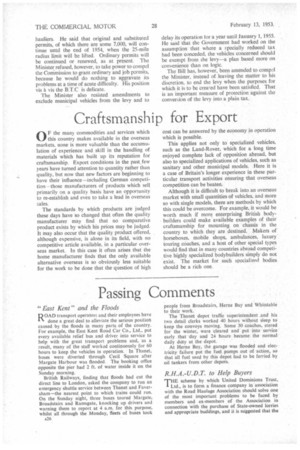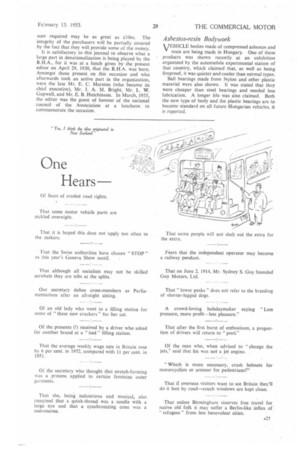Passing Comments
Page 28

Page 29

If you've noticed an error in this article please click here to report it so we can fix it.
"East Kent" and the Floods
p OAD transport operators and their employees have " done a great deal to alleviate the serious position caused by the floods in many parts of the country. For example, the East Kent Road Car Co., Ltd., put every available relief bus and driver into service to help with the great transport problems and, as a result, many of the staff worked continuously for 60 hours to keep the vehicles in operation. In Thanet, buses were diverted through Cecil Square after Margate Harbour was flooded. The booking office opposite the pier had 2 ft. of water inside it on the Sunday morning.
British Railways, finding that floods had cut the direct line to London, asked the company to run an emergency shuttle service between Thanet and Faversham—the nearest point to which trains could run. On the Sunday night, three buses toured Margate, Broadstairs and Ramsgate, knocking up drivers and warning them to report at 4 a.m. for this purpose, whilst all through the Monday, fleets of buses took A26 people from Broadstairs, Herne Bay and Whitstable to their work.
The Thanet depot traffic superintendent and his two detail clerks worked 40 hours without sleep to keep the convoys moving. Some 30 coaches, stored for the winter, were cleared and put into service early that .day and 24 hours became the normal daily duty at the depot.
At Herne Bay, the garage was flooded and electricity failure put the fuel pumps out of action, so that all fuel used by this depot had to be ferried by oil tankers from other depots.
R.H.A.-U.D.T. to Help Buyers
THE scheme by which United Dominions Trust, Ltd., is to form a finance company in association with the Road Haulage Association should solve one of the most important problems to be faced by members and ex-members of the Association in connection with the purchase of State-owned lorries and appropriate buildings, and it is suggested that the
sum required may be as great as £10m. The integrity of the purchasers will be partially ensured by the fact that they will provide some of the money.
It is satisfactory to this journal to observe what a large part in denationalization is being played by the R.H.A., for it was at a lunch given by the present editor on April 29, 1930, that the R.H.A. was born. Amongst those present on this occasion and who afterwards took an active part in the organization, were the late Mr. E. C. Marston (who became its chief executive), Mr. J. A. M. Bright, Mr. L. W. Gupwell, and Mr. E. B. Hutchinson. In March, 1935, the editor was the guest of honour of the national council of the Association at a luncheon to commemorate the occasion.
Asbestos-resin Bodywork
VEHICLE bodies made of compressed asbestos and v resin are being made in Hungary. One of these products was shown recently at an exhibition organized by the automobile experimental station of that country, which claimed that, as well as being fireproof, it was quieter and cooler than normal types.
Ball bearings made from Nylon and other plastic material were also shown. It was stated that they were cheaper than steel bearings and needed less lubrication. A longer life was also claimed. Both the new type of body and the plastic bearings are to become standard on all future Hungarian vehicles, it is reported.




















































































